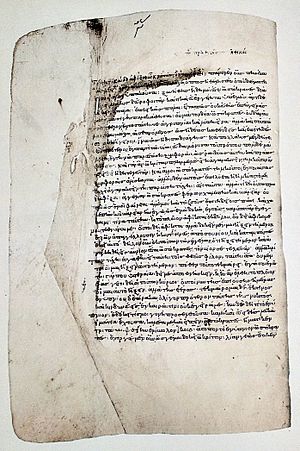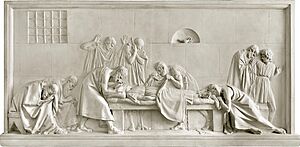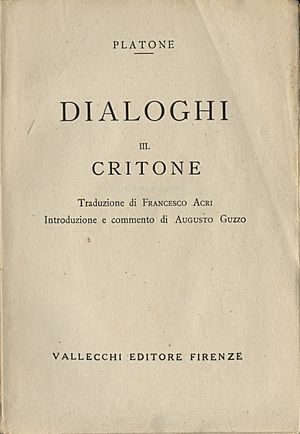Crito facts for kids
Crito (pronounced KRY-toh or KREE-toh) is a famous conversation written by the ancient Greek philosopher Plato. It tells the story of a talk between Socrates and his rich friend Crito of Alopece. They discuss what is fair (justice) and what is unfair (injustice). They also talk about how to act when you face something unfair, especially after Socrates was put in prison. This story happens after Socrates' trial, which is told in another book called Apology.
In Crito, Socrates believes that you should never fight injustice with more injustice. He even pretends the Laws of Athens are talking to him to explain his point. Socrates refuses Crito's offer to help him escape from prison. This dialogue also shares an early idea of the social contract theory. This theory says that people agree to follow the rules of their society. Today, people still discuss if Crito means we should always obey laws, no matter what. This writing is thought to be one of the few works by Plato that shows Socrates' real thoughts, without too much of Plato's own ideas mixed in. It was likely written around the same time as the Apology.
Contents
What Happened Before
The dialogue Crito might be based on real events. It was probably published in 399 BCE. Socrates had been in prison for about four weeks after his trial. He was going to be put to death in just a few days. We don't know the exact spot of Socrates' prison cell. But experts think the old Athenian prison was near the Heliaia court. This was just outside the city's main gathering place, the agora.
Plato wrote Crito as a story, so it's not a perfect record of history. We can't be sure if everything said was exactly what happened. We also don't know how much of Plato's own thoughts are in Socrates' words.
Only two people are in the story: Socrates and Crito. Crito was a wealthy man from Athens, just like Socrates. When Socrates was accused of teaching bad ideas to young people, Crito tried to help him. Crito offered to pay bail, but it didn't work. After Socrates was sentenced to death, Crito was ready to promise the court that Socrates would not run away. This offer was also turned down. Crito was there for Socrates' trial and when he was put to death.
In other stories by Plato, Crito is shown as a typical Athenian. He tried to understand Socrates' deep ideas but often found it hard.
Many experts believe Crito is a true work by Plato. Some newer research has questioned this, but most agree it's real. Some think Crito is from Plato's middle period of writing. In this period, Socrates would ask questions to show problems in other people's ideas. However, most experts place it in Plato's early writings. Here, Socrates speaks like an expert on the topic.
Some historians, like Mario Montuori, think Crito was written closer to another work called Laws. They believe it was written after Socrates died in 399 BCE.
Historian Xenophon said that Plato's friends made plans for Socrates to escape. We don't know if these plans were like the ones in the story. Many historians believe the Socrates in Crito is very much like the real Socrates. William K. C. Guthrie thought the idea of a social contract fit Socrates' way of thinking.
The Story of Crito
Crito's Arguments
Early in the morning, before visitors were usually allowed, Crito arrived at Socrates' prison cell. He had bribed the guard to get in. Crito sat quietly next to Socrates until he woke up. Socrates noticed Crito was there very early. Crito was worried because Socrates seemed so calm about his upcoming death. Socrates replied that he was almost 70 years old. He felt it would be wrong to be afraid of dying.
Crito had come to tell Socrates that his execution would happen the next day. He wanted to save his friend. Crito had a plan to bribe all the guards. He promised Socrates he had enough money for the escape. He also said other friends were ready to help pay. After escaping, Socrates would go to a home in Thessaly. Crito and his friends would be happy to give him a place to live and food.
Crito argued that if Socrates died, Crito would lose a great friend. Crito also said Socrates' sons would miss out on a good education and life. They deserved this as the children of a philosopher. Crito also pointed out that it's wrong to abandon your children if you choose to have them. Also, if Socrates didn't escape, people would think badly of Crito and his friends. They might believe they were too cheap to save Socrates. Crito also said it was important to care about what most people think. He warned that the majority "can inflict... the greatest evils" if they speak badly about someone. Finally, Crito told Socrates not to worry about any punishment for him or his friends. They felt the risk was worth taking.
Socrates' Arguments
After hearing Crito's ideas, Socrates asked to explain his own thoughts. He wanted to discuss some big questions, and Crito agreed not to interrupt. As Socrates spoke, Crito only agreed with his words. Socrates first said that we should listen to the opinions of people who are experts. We should ignore opinions from people who are biased or don't know much. Also, just because many people believe something doesn't make it true. Socrates used the example of an athlete. An athlete should listen to their doctor, not their fans. The doctor's knowledge makes their advice more valuable.
Socrates believed that harming your soul through injustice makes life meaningless for a philosopher. It's like a person who hurts themselves badly and can't live a good life. A person's main goal should be to live a good and fair life, not just a long one. So, escaping from prison would need to be a discussion about what is truly just.
Socrates didn't care about Crito's worries about his reputation or his children's future. He said these things were not important to him. He compared such reasons to someone who sentences another to death and then feels bad about it. Socrates then said Crito and his friends should know better. They had believed in the same principles for a long time. Giving up those beliefs now would be childish. He said that doing wrong to the state, even if the state had done wrong to him, would still be an injustice.
Laws and Justice
Socrates then asked if he should harm someone or ignore a fair duty. To answer this, he imagined the Laws of Athens speaking. He spoke from their point of view, defending the state and its decision against him.
According to Socrates, the Laws would argue that a state cannot exist if people don't respect its rules. They would criticize Socrates for thinking he or any citizen could ignore court decisions. This would lead to chaos. Socrates could argue that this specific decision was unfair, but still believe the law itself is fair and should be followed. He could say that disobeying this ruling was just. This idea is similar to what Martin Luther King Jr. said about unfair laws. However, Crito never got to make this argument because Socrates stopped him.
The Laws would also say that if Socrates accepted Crito's offer, he would put his friends at risk. They could be caught or lose their money. As a person running from the law, Socrates would be seen as suspicious by good citizens in other places. He would be suspected of breaking laws in his new home. He would have to live in a disorganized place like Thessaly. There, he could only tell crowds the story of his unfair escape. As a philosopher who had broken his own rules, he would lose his respect. He would have to give up his happy life and find meaning only in things like food.
In the end, Socrates said that if he accepted his execution, he would be wronged by people, not by the law. He would remain a just person. But if he took Crito's advice and escaped, Socrates would wrong the laws. He would betray his lifelong search for justice. After finishing the imaginary speech of the Laws, Socrates said he felt tied to the laws like a dancer to music. He asked Crito to argue back if he wanted. Crito had no objections. Before Crito left, Socrates mentioned that he hoped for help from a higher power.
Big Ideas in Crito
Crito highlights the importance of using reason to understand what is right and wrong. Unlike some of Plato's other works, Socrates seemed more confident here that knowledge comes from experts.
The deep meaning of the Laws and how they affect society are not fully explored in Crito. The Laws are used as a character to explain how Socrates should act.
Social Contract
The idea of the Laws speaking is different from Plato's usual criticism of Athens. The state's demand for loyalty was an early idea of a social contract. This means citizens have an agreement with the state. They understand what it means to be a citizen. In Athens, a person became a citizen after passing a test called dokimasia. You weren't just born a citizen. This test is mentioned in Crito.
Following the Law
One of the most debated ideas in Crito is Socrates' view of laws as if they were a person. It suggests that citizens who can't change laws must obey them to remain "just." Those who don't want to live under such laws should move away if they want to live a good life. Socrates eventually rejects the idea of leaving. He believes it is right because the court suggested it and the ruling was unfair. However, this idea fits with Plato's overall teaching. It always puts avoiding injustice first.
Laws and Personal Choice
Many researchers say there's a planned difference between Plato's Apology and Crito. In Apology, Socrates said he would not obey a court if it forced him to stop teaching philosophy. He said this would be unfair to him.
Some people, like Michael Roth, say there is no real difference. They argue that the real situation in Crito and the imagined situation in Apology are different. So, they should be judged differently. Another idea is that Socrates' argument in Apology was just a thought experiment. A ban on philosophy had no legal basis. The court couldn't actually give Socrates such a punishment unless he suggested it himself.
Italian historians Mario Montuori and Giovanni Reale explained the difference by saying the books were written at different times. They think Apology was written later. In Apology, Plato mainly reported what Socrates said. But when writing Crito, Plato shared his own thoughts through Socrates' words.
However, if Socrates' punishment couldn't happen, professor Necip Fikri Alican argued that Socrates wouldn't just use meaningless thought experiments. Philosophy professor James Stephens simply believes this problem has no easy answer.
See also
 In Spanish: Critón (diálogo) para niños
In Spanish: Critón (diálogo) para niños
 | William Lucy |
 | Charles Hayes |
 | Cleveland Robinson |




